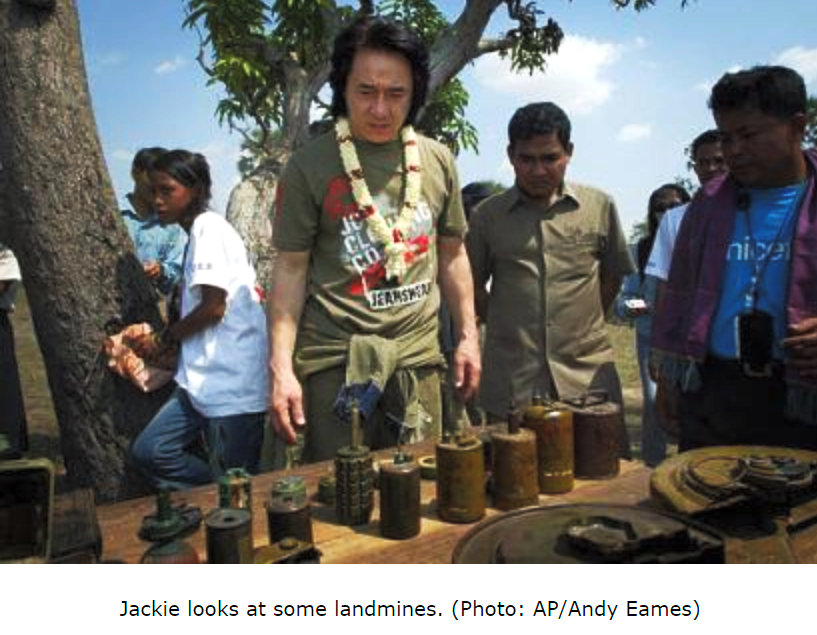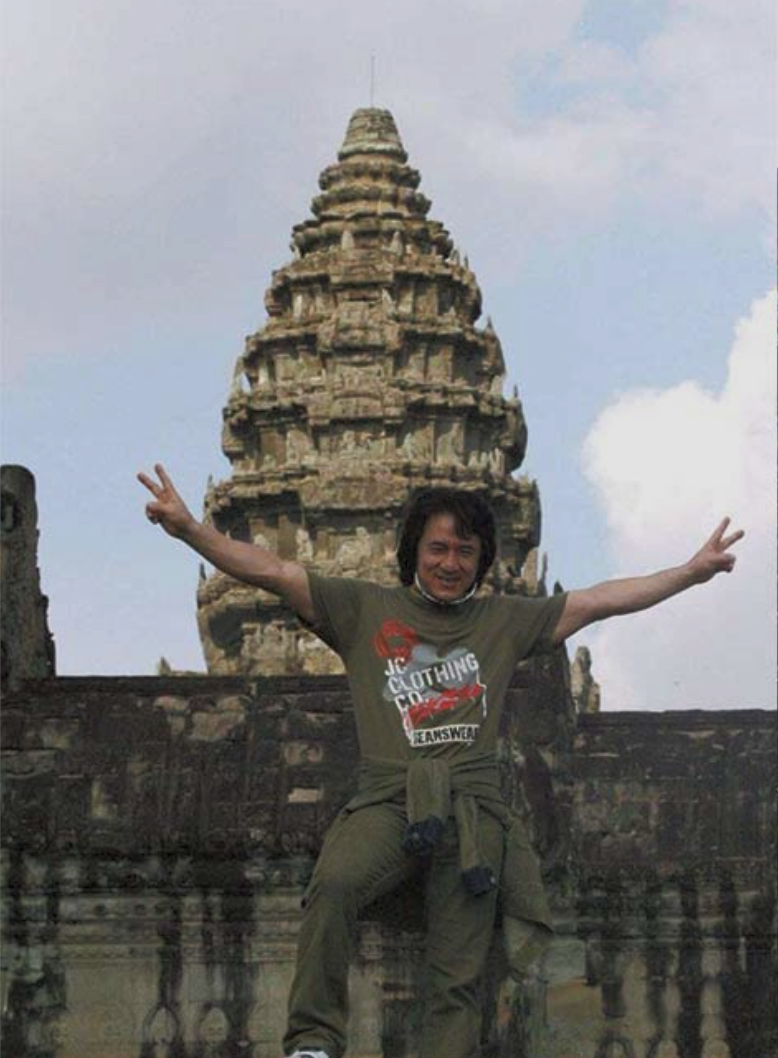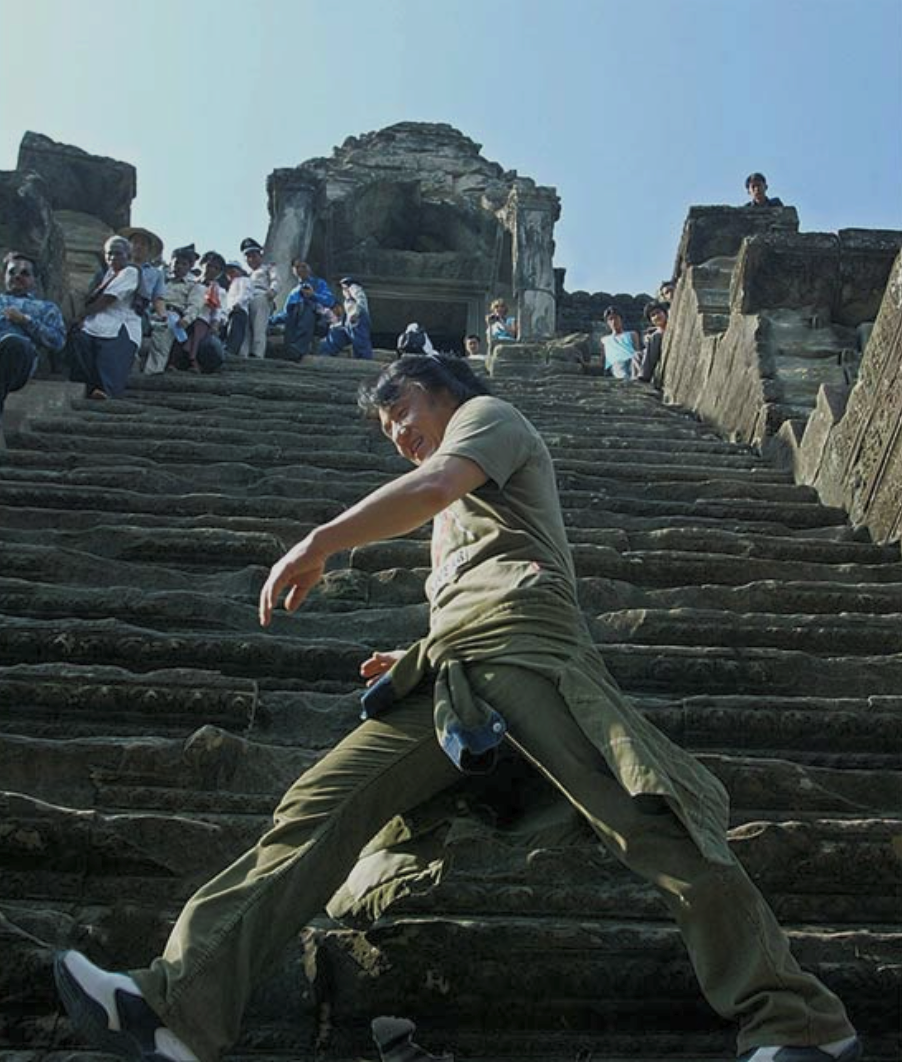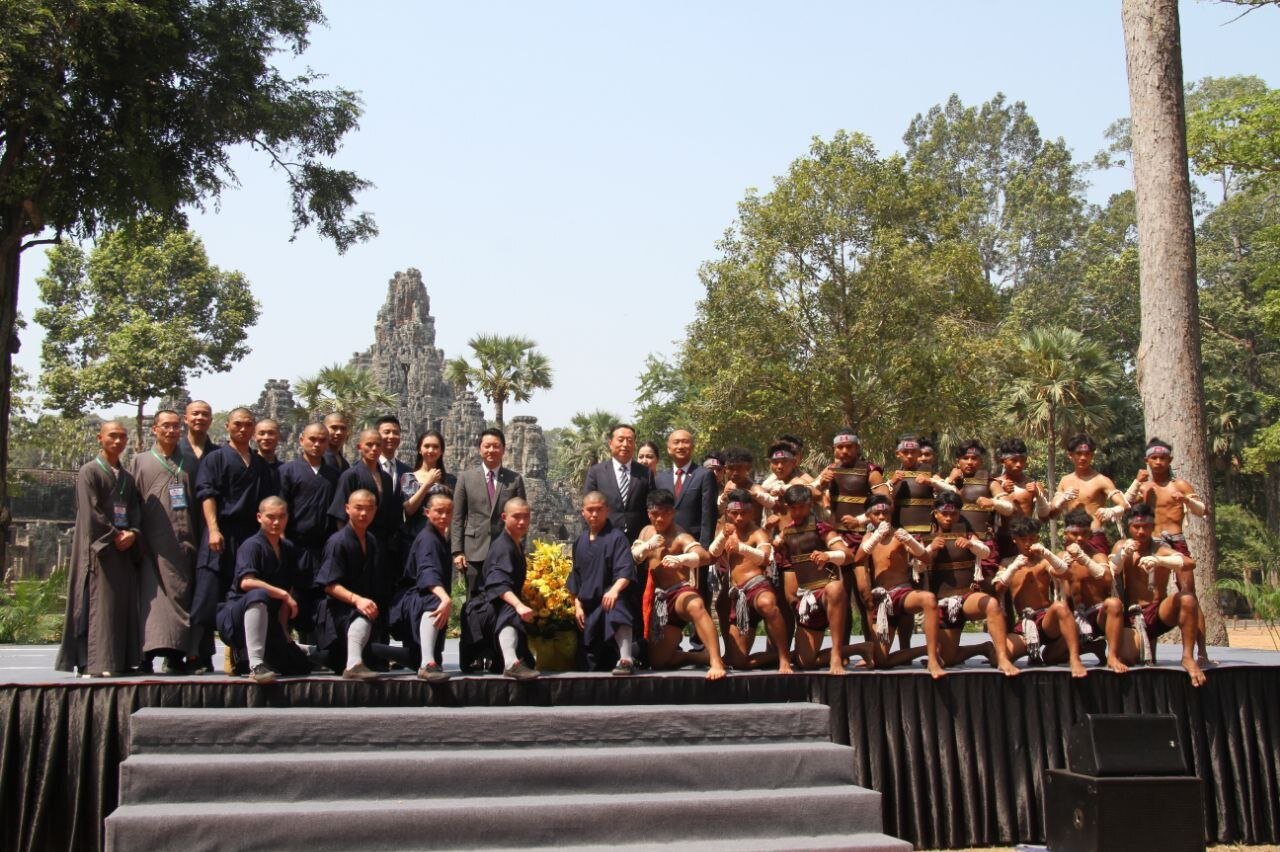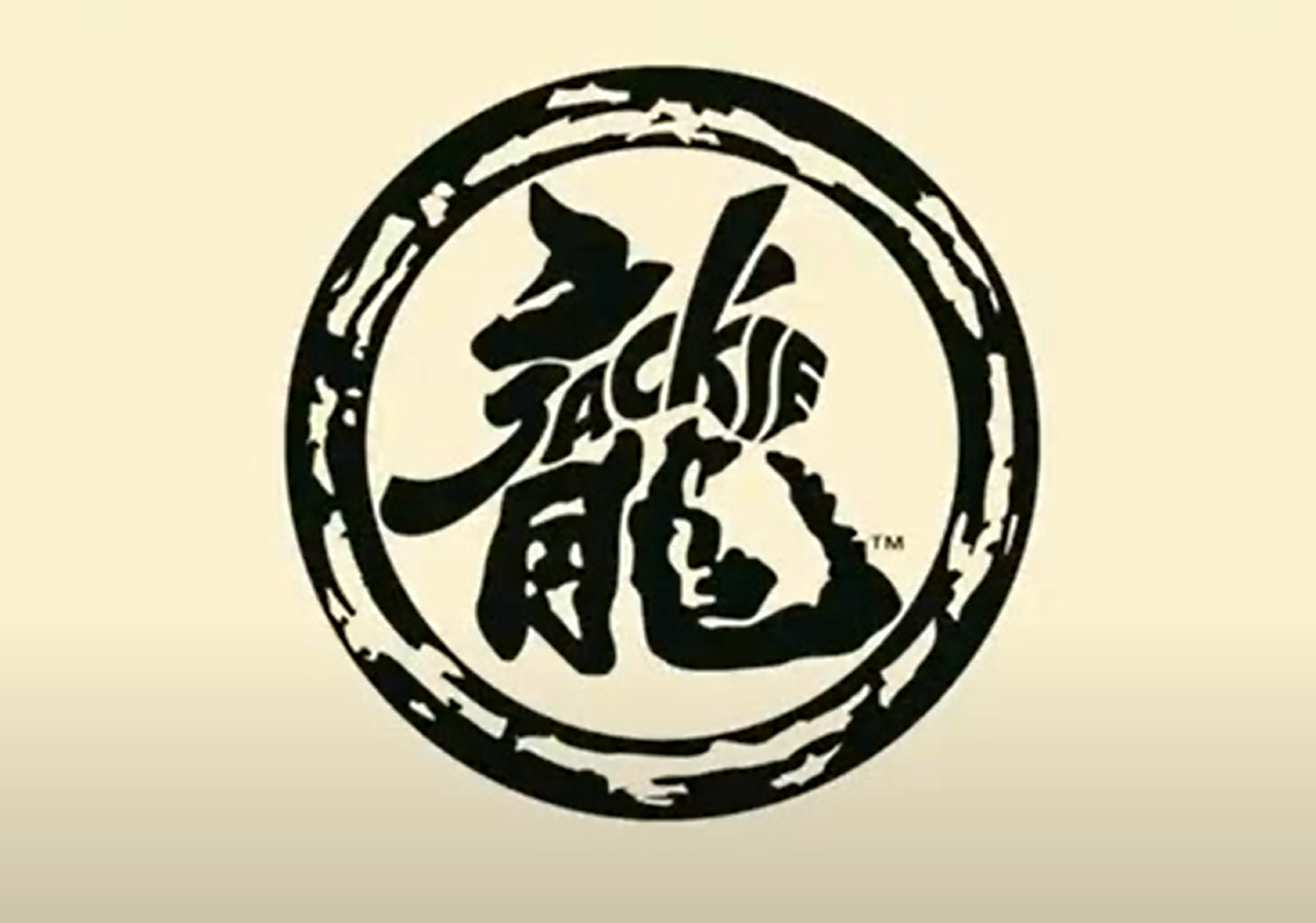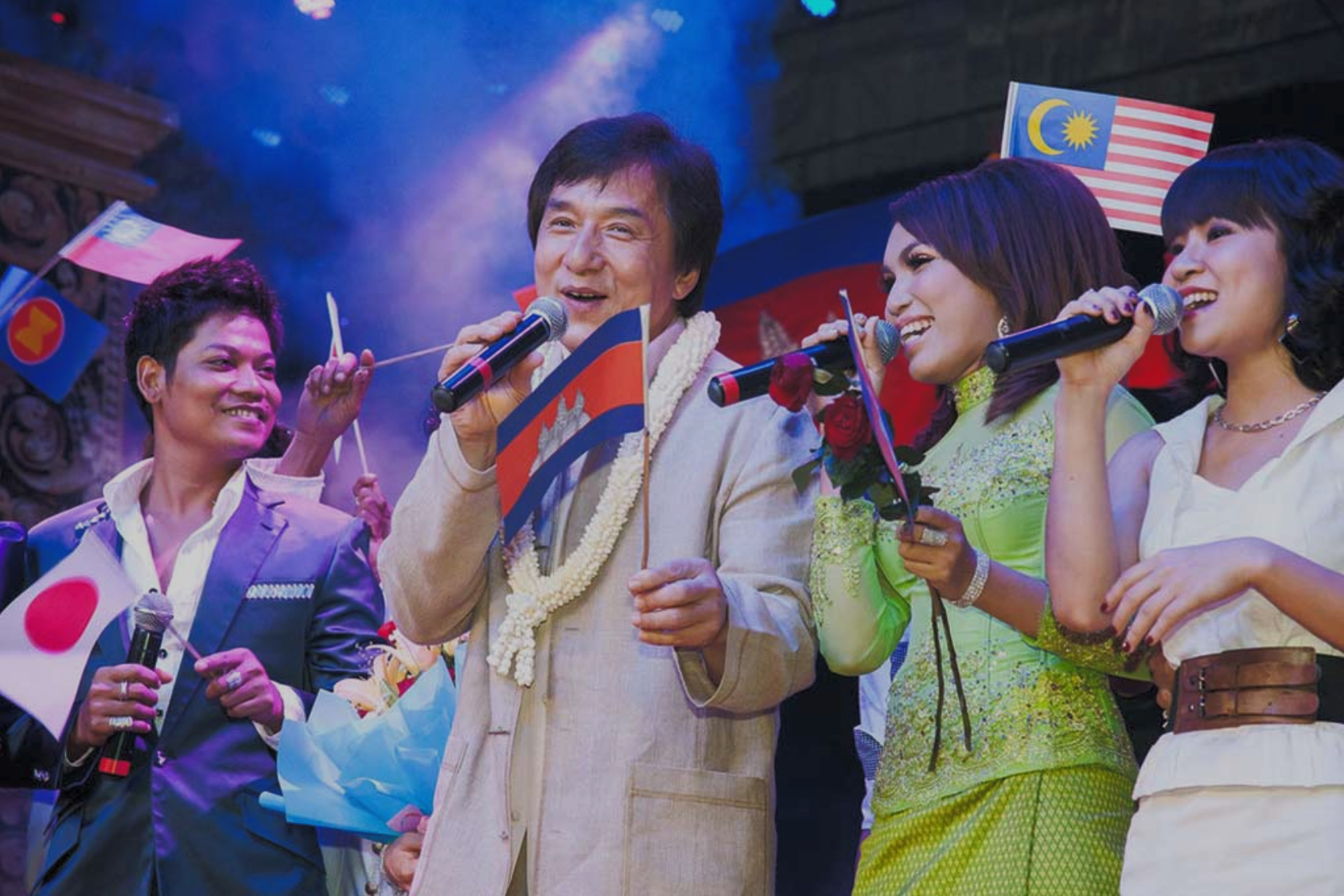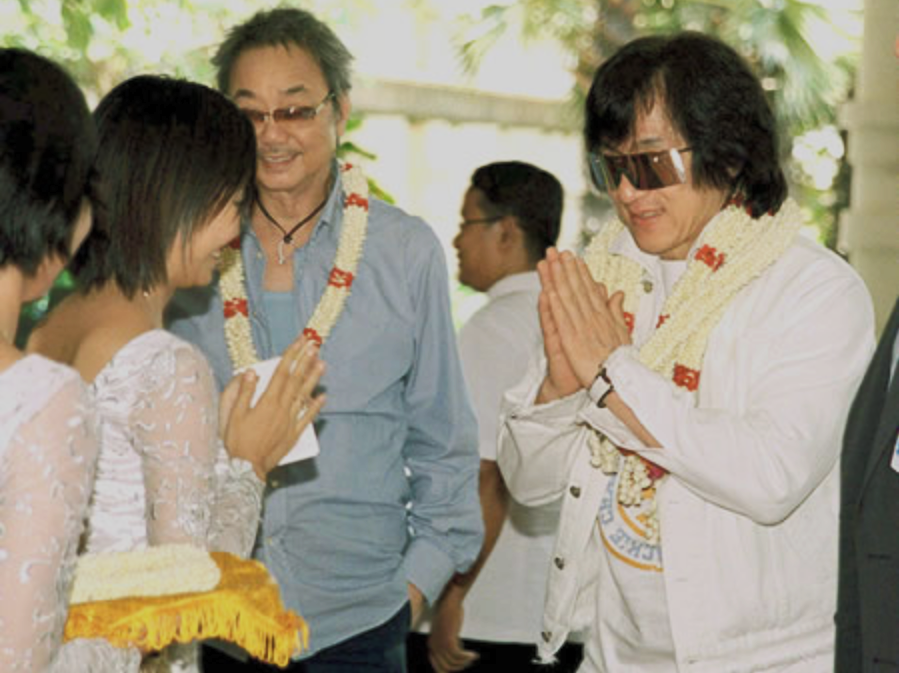April 2004: Jackie Chan Goes to Angkor
by Angkor Database
The iconic actor discovered Cambodia in 2004. He was back the year after, and then again in 2009, always with a dream: starring and directing a movie here.
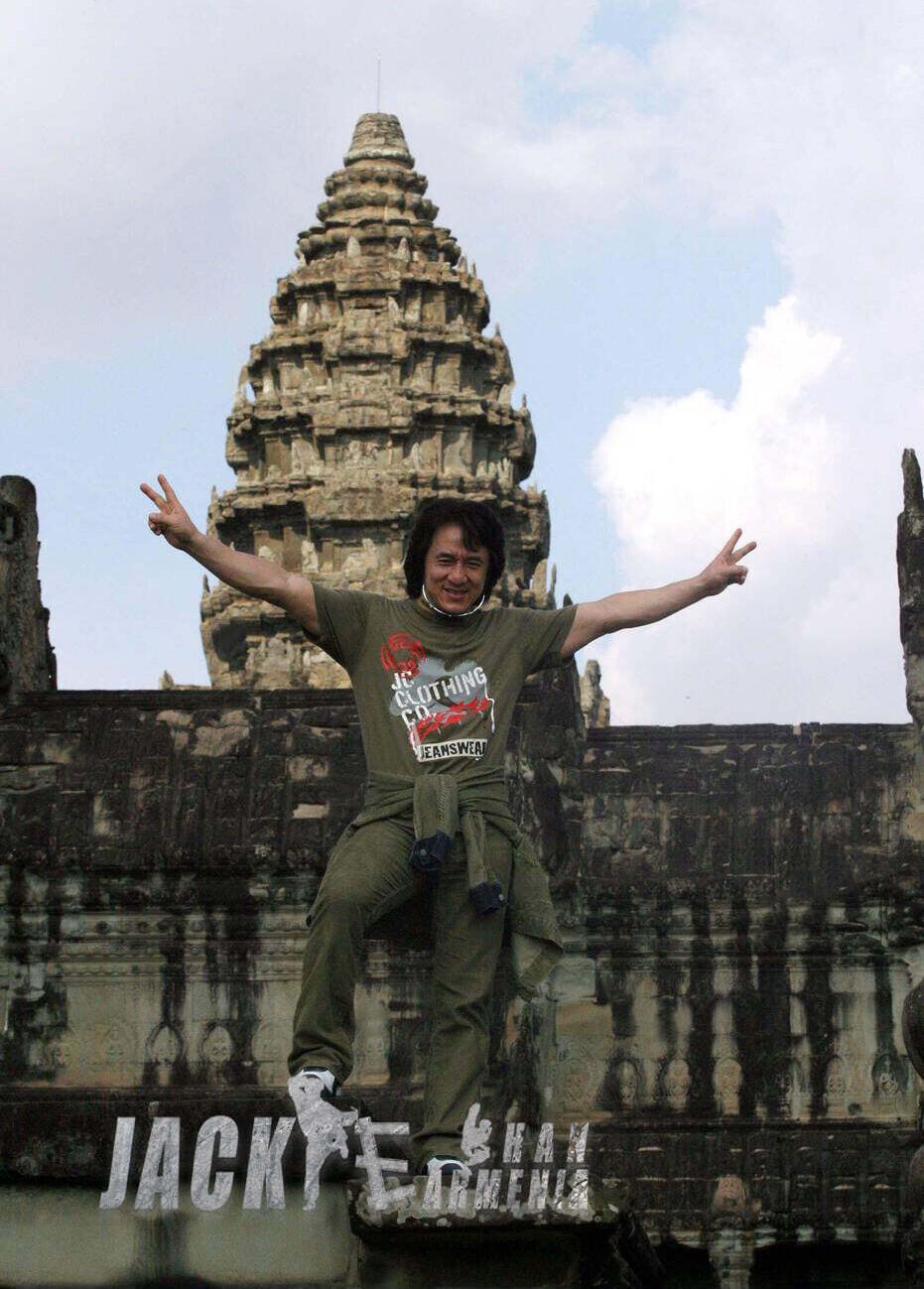
- Publication
- ADB Research JCHAN/2004
- Published
- April 23rd, 2024
- Author
- Angkor Database
- Language
- English
On 26 – 29 April 2004, forever “Young Master” Jackie Chan, living legend of the kungfu comedy genre, stuntman, actor and director in a myriad of blockbuster movies (from 1962 Big and Little Wong Tin Bar 大小黄天霸 to 2024 The Karate Kid Sixth 空手道小子6), visited Cambodia. He went to Angkor Wat, visited orphanages as a UNICEF-USAID goodwill ambassador, inspected landmines, met with HIV victims — Cambodia had then Southeast Asia’s highest HIV infection rate, 3.8 % in1997 –, was granted an audience with then Prime Minister Hun Sen, and announced he planned to shoot a movie here, a project that never came to fruition.
But it was not a one-shot attempt: less than one year later, in July 2005, the actor-director Chan Kong-Sang (his birth name in 1954) was back to Cambodia, this time on his way back from Aceh (Indonesia), where he had visited struggling survivors of the 23 December 2004 tsunami. That time, he focused on Battambang hospitals and rehabilitation centers for landmine victims, reiterating he wanted to make a movie with the working title of Cambodia Landmine. According to film insider Andy Brouwer, it was planned as “a drama-comedy with a $25 million production budget, to be directed by Ding Sheng.”
And there’s more: in November 2009, ‘Cheng Long’ — Jackie Chan’s favored nickname in Asia — was back, to get an honorary doctorate from the University of Cambodia and to take part in a star-studded concert sponsored by ASEAN International Peace Foundation. And once again, he mentioned his wish to shoot a movie of his own in Cambodia, yet this time the focus had changed: ahead of his time, he had realized the scope of Khmer artefacts looting, and he wanted to raise that subject on the international scene. Dr Tilman Baumgarten, who was present at the events, recalled on his blog: “After a traumatic accident in Yugoslavia during the shoot of his Indiana-Jones-Rip-Off Armour of God (1987), he decided to found a charity, and he mostly spoke about his philantrophic work during his brief speech. He also announced that he would start shooting a movie on stolen artefacts next year, and that one part of the movie would be shot in Angkor Wat. To the shock of some of his hardcore fans, he denounced his break-throough movie Drunken Master (“It teaches you only to drink and to fight!”), and eventually called on all his listeners not to leave left-overs in their water bottles, but to use them to water trees, and then crush them, so they take up less space.”
Serendipity: on this 20th anniversary of Jackie Chan’s first visit, the event When Shaolin Meets Bokator at Angkor is taking place right at Bayon Temple, Angkor Thom, a ‘Cambodia-China People-to-People Exchange Year 2024’ initiative involving some 300 martial arts from Henan Province School of Shaolin Martial Arts and Kun Bokator Association. [Why precisely at Prasat Bayon? Certainly because of the famous bas-reliefs depicting Chinese wrestlers in Angkor Thom in the 12th century.]
Shortly after his latest visit to Cambodia, in 2011, Jackie produced a feature movie by another director, Franklin Chan Fan-kei [Frank Chan (not related)], Legendary Amazons. And that same year, he made a special appearance in Benny Chan’s Shaolin, alongside Andy Lau, Nicholas Tse, Fan Bingbing, Wu Jing, Yu Shaoqun, and Xing Yu. And BBC World Service Trust Phnom Penh produced one TV drama,“Taste of Life”, with Jackie Chan and Louk Chouy, as “My Journey”.
So, why did it not happen? We have asked that question to Jackie Chan’s production company, and to the Cambodian Film Commission. Was it related to the lack of Cambodian policy towards film production incentive? In Malaysia, for instance, film productions are awarded 30% cash rebate on all qualifying expenditure. And Thailand has recently attracted. Or was it linked to Chan’s own career? In a bio profile by Ng Kwong Loong (“Jackie Chan Biography (an Asian perspective)”), we learn that
Jackie attended from age 7 the Yu Jim Yuen’s Training Academy to study Peking Opera in Australia (his parents had previously worked as janitors at the Hong Kong French embassy), and that he entered the film industry in 1971 to work as an extra or stuntman. After Fearless Hyena hit (1979), Jackie broke his contract and left for the greener pastures of Golden Harvest, but Lo used his Triad connections and started having thugs sent to the set to threaten Jackie. With the help of ‘One-Arm-Swordsman’ Jimmy Wang Yu, the Triad affairs were taken care of and Jackie remained with Golden Harvest. To propel Jackie beyond Asia, GH then sent Jackie to the States to do a Hollywood movie — The Big Brawl — which unfortunately flopped everywhere, be it Asia or America, as Jackie did not have much say in fight choreography and editing. Ego bruised, Jackie returned from the States an angry man. […] The rest of the 80s was regarded as the heyday of Hong Kong fighting movies, with Jackie and Sammo clearly leading the pack. Jackie’s 2nd Hollywood outing in 1985’s The Protector also ended in failure, and Jackie decided to concentrate on the Asian market. HK made hits like Wheels On Meals, Police Story I & II, Armour of God, Project A II and Dragons Forever etc established Jackie’s ‘kungfu superstar’ reputation and made ‘Cheng Long’ (rather than Jackie Chan) a household name in Asia, just as famous and familiar as Bruce’s ‘Li Xiao Long’. A generation of people grew up watching his 70s (even the Lo Wei ones) and 80s hits. To them, ‘Cheng Long’ is already big enough to qualify as an international superstar, Hollywood or no Hollywood. […] A slight change became of Jackie’s movies, and henceforth, Jackie Chan movies were never the same as before. Change isn’t always bad, and a change is might as well to increase Jackie’s screen time. Movies like Twin Dragons, Police Story III , City Hunter and Crime Story each had their unique moments. […] In the mid and late 90s, Jackie reckoned instead of going America (again) to make Hollywood movies where he had no control, why not modify his HK movies to make them seem like Hollywood movies? This certainly seems to be the answer as he went to great lengths to court the global white market. A drastic change became of his HK movies: a predominantly Caucasian cast, English dialogue, foreign locations (outside Asia), large-scale set pieces and vehicular stunts, and abolishing of end fights. The fans who grew up watching his 80s hits were disappointed with Rumble in the Bronx, and again with the following year’s First Strike, and again with the following year’s Mr Nice Guy and again and again…In their respective years of release, these pseudo Hollywood movies drew amazing box-office, and probably the box-office success misled Jackie into thinking that this was the right move. These movies were important though, because their predominantly English dialogue and their near global distribution helped Jackie gained more international fans. Keeping his Asian fans satisfied remained a priority, though no longer the main one. Having found official global stardom, Jackie is detemined not to lose his hard earned international fans. Looking back at these movies now, they were merely the ‘flavours-of-the-month’ hits, which one forget after leaving the cinema. […] The US posters for these movies are a joke, reflecting the US distributor’s sloppy treatment of Jackie’s HK movies. The end result? With the butchered versions, US mainstream audience are still not fully attracted (and understandably so) to the Asian icon. And the man himself, misled by the local box-office success and the general impression of Western takeup of his earlier works, continued to churn out movies like Who Am I, disappointing his Asian fans even further. Rush Hour was Jackie’s real Hollywood comeback movie. It was a smash hit in the US, collecting US$130 million. It then seemed that Jackie finally had his American dream come true. Critics claimed Rush Hour’s success is due more to Chris Tucker than Jackie Chan. It certainly seemed this might be true when Shanghai Noon came out and bowed out with a mere US$50 million. With the exception of Rush Hour 2 (again with Chris Tucker), The Tuxedo and Shanghai Knights enjoyed respectable, but unspectacular box-office success, confirming views that Jackie had not really made it to the Hollywood big league.
In closing, here’s an excerpt from The Sydney Morning Herald dispatch from Phnom Penh, 30 Apr 2004:
Jackie Chan, the action star from Hong Kong and newly appointed UN goodwill ambassador, says he might shoot a movie in Cambodia.“First, I was joking, but now I’m taking it seriously,” Chan told reporters after meeting with Cambodia’s Prime Minister Hun Sen.
He said he had “a very good conversation” with Hun Sen about the possibility of filming in the impoverished nation. “When I go back (to Hong Kong) I will think about the script. I’m sure I’m coming back very quickly. I will see how to make a film in Cambodia,” he said.
Chan — a box-office star of Hollywood and Chinese-language movies for more than 20 years — was recently appointed a goodwill ambassador for the United Nations’ Children’s Fund and UN AIDS agencies. He did not say what sort of movie he might make in Cambodia.
But Eang Sophalleth, a Hun Sen spokesman, said Chan told the leader that the script should reflect the struggle for happiness by people who have been affected by conflict and disease.
“The prime minister has welcomed and supported Jackie Chan in making a movie in Cambodia … to help the world be safer from the danger of land mines, unexploded ordnance and HIV/AIDS problems,” he said. During his stay, Chan met with HIV/AIDS victims, visited a land mine rehabilitation centre, and toured Cambodia’s famed Angkor Wat temple.
Tags: celebrities in Angkor, movies, HIV, landmines, film incentives, looted art, Khmer art, martial arts, bokator
About the Author

Angkor Database
Angkor Database — មូលដ្ឋានទិន្នន័យអង្គរ — 吴哥数据库
All you want to know about Angkor and the Ancient Khmer civilization, how it keeps attracting worldwide attention and permeates modern Cambodia.
Indexed and reviewed books, online documentation, photo and film collections, enriched authors’ biographies, searchable publications.
ជាអ្វីគ្រប់យ៉ាងដែលអ្នកទាំងអស់គ្នាចង់ដឹងអំពីអង្គរ, អរិយធម៌ខ្មែរពីបុរាណ, និងមូលហេតុអ្វីដែលធ្វើឲ្យមានការទាក់ទាញចាប់អារម្មណ៍ពីទូទាំងពិភពលោកបូករួមទាំងប្រទេសកម្ពុជានាសម័យឥឡូវនេះផងដែរ។
Our resources include a physical library library at Templation Angkor Resort, Siem Reap, Cambodia.
email hidden; JavaScript is required

